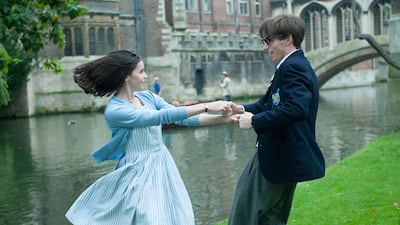The Theory of Everything
Director: James Marsh
Starring: Eddie Redmayne, Felicity Jones, Maxine Peake
Five stars
The renowned British physicist Stephen Hawking has never had small ideas or small ambitions, least of all his audacious youthful quest to find a unifying “theory of everything” that would explain the entire universe in one simple equation.
He may not have found exactly that, but what Hawking has accomplished, we learn anew in James Marsh's The Theory of Everything, is staggering. And Eddie Redmayne's portrayal of the scientist is, in its own way, also remarkable.
Diagnosed with motor neuron disease at 21, Hawking was given only two years to live. A half-century later, he remains very much alive at 72, and he and his ideas are known around the world – his book A Brief History of Time has sold more than 10 million copies.
It's a daunting task to capture such a remarkable life in one movie, and The Theory of Everything cannot totally escape the typical biopic trap of covering so much time that no single idea is explored deeply enough. Add to that the pressure of having a subject as well-known as Hawking.
On top of it all, there are the physical challenges of portraying his progressive disability, while also channelling the bold, complex and often impish spirit underneath.
All of this makes the performance of the youthful Redmayne, at 32 playing his first lead in a movie, so exciting, and reminiscent of another British actor's memorable portrayal at the same age of a real-life disabled figure – Daniel Day-Lewis as the writer and artist Christy Brown, who had cerebral palsy, in 1989's My Left Foot.
We begin at Cambridge in 1963 with Hawking, a young graduate student in cosmology, exuberantly racing his bike around town, goofy and gangly, with huge black glasses and an oversized grin to match.
At a party, he spots the winsome Jane (Felicity Jones, thoughtful and touching here), and sets about pursuing her. Love blooms and life’s possibilities appear as boundless as the universe – whether or not it has boundaries is a key question here – until Hawking starts experiencing clumsiness. After a bad fall, he’s diagnosed with ALS, which will result in gradual muscular degeneration.
“What about the brain?” he asks. “You’ll have the same thoughts,” he is told, “only eventually, no one will know what they are.”
He falls into a deep depression, saved only by Jane’s stubborn love. Thus begins a marriage that will last a quarter-century, produce three children and test Jane’s physical and emotional endurance to the limits – the film is based on her second memoir, adapted by the screenwriter Anthony McCarten.
Along the way, pneumonia almost kills him. A tracheotomy saves his life but deprives him of the ability to speak, leading to his famous computer-generated voice. Redmayne, relying on less and less of his body, succeeds in expressing more and more – with his eyebrows, his eyes, and that broad smile, showing what a humorous man Hawking can be.
He’s heartbreaking, though, in the scene where he essentially ends his marriage, telling Jane that he’s asked his perky nurse Elaine Mason (Maxine Peake) to travel to America with him.
Mason became Hawking’s second wife, while Jane married a family friend. The various relationships feel somewhat airbrushed – perhaps not surprising given that the film is based on one person’s memoir.
What shines through, though, is the humanity in Hawking’s incredible story.
“However bad life may seem, where there is life, there is hope,” the physicist tells an audience, and that line could seem hokey in some circumstances, but not here.
If anyone gets to say that, it’s Stephen Hawking, so eloquently embodied in this film.

